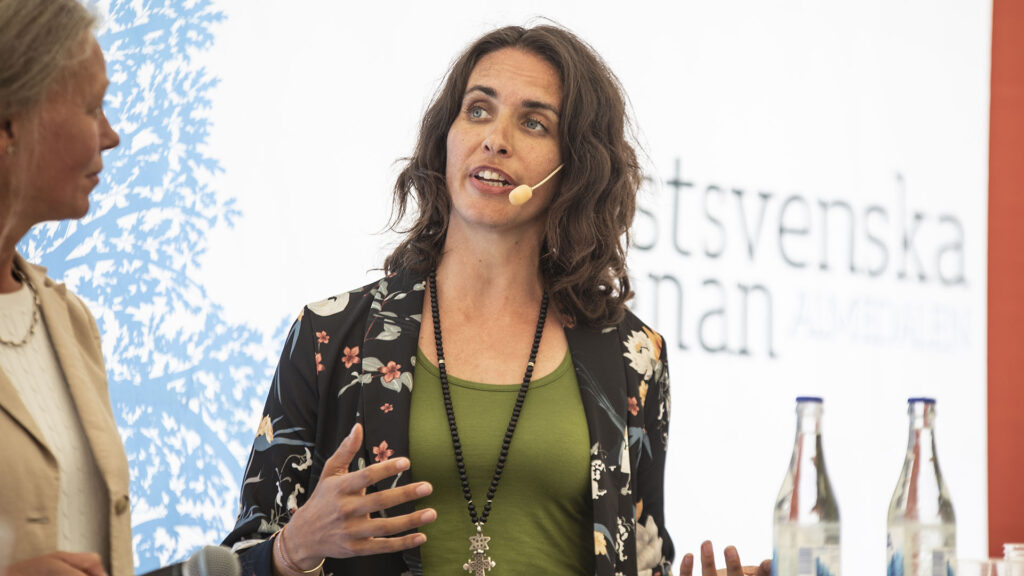
Dagens Industri, the leading financial newspaper in Sweden, has placed Frances Sprei at number 25 on their list of mobility agenda setters. Frances is professor at Chalmers University of Technology researching on sustainable mobility with a focus on e-mobility, and she has been involved in several research projects within Swedish Electromobility Centre the last ten years. We got the opportunity to ask her a few questions about the future of e-mobility.
https://www.di.se/nyheter/mobilitetsprofilerna-som-satter-agendan-2025/
Congratulations Frances! Why do you think you are on this list of mobility agenda setters?
I think that this recognition from DI mobility, which I’m grateful of, is because I do policy relevant research, for example my EV-related research is one of the most quoted in policy documents. I try to meet and interact with politicians and other actors as often as I can to discuss mobility matters, and I have been involved as an expert on several occasions. I’m also chairperson for Västra Götalands climate transition research council.
A lot has happened in the electrification of heavy vehicles the last years. Could we see a breakthrough the coming years for long-haul transportation?
Yes, there has been a fast development, and I would not have guessed that we would be this far ahead ten years ago. If there’s a sufficient charging infrastructure that makes logistic operations feasible, and financially sound, there is no real reason for haulage companies not to use electric trucks. Sweden is very far ahead when it comes to charging infrastructure so the main issue here, I would say, is to get cost competitive compared with diesel. Once that happens, I think that we can have a faster breakthrough on the heavy-duty side than for cars.
What is needed to push the electrification for cars then?
It’s also a matter of cost but in a different way. A consumer is not trying to make a profit but wants a car that is reasonably affordable. Today there are not enough models in the lower price segments on the European market. However, we are now starting to see a wider range of models, and I think that a lot will happen in the next couple of years. There are also still some myths about electric cars that might be deterring some. One that is rather persistent is that battery electric vehicles are worse for the environment than combustion vehicles, even though this has been proven wrong in many studies. There are also concerns about battery lifespan, which I believe stem from issues with early models in warmer climate. Today the technology is very good and speaking from a personal experience I think that electric cars are very pleasant to drive.
What’s most important for the electrification, technology or policy?
If we want to see some fast results and speed up the electrification I would say policy, such as higher fossil fuel prices. The technology we have today is good and works, but we still need further development, especially on batteries, to get the costs down and to some extent decrease the dependency on rare earth elements. We are still in an early phase compared to the combustion engine that has had over 100 years of development. So, in the long run we will be seeing increasingly better electric vehicles.
When do you think the Swedish road transport system is mainly electrified?
It’s always hard to give an exact year but it could be around 2050 or a few years later.
Are there any missing pieces for a wide acceptance?
To get a wide acceptance for electric cars I think that we also need to look at disparities in charging prices. There can be high variations depending on where you live. This is not a technical issue; I don’t think that charging the car will be a problem. It’s about having sound business models in place with fair prices that people can accept.
What’s your view on the world developments?
Of course, it’s worrying that the diminishing focus on the climate issue is halting important work to solve it. I’m also concerned that Europe is lagging in the electrification compared to China. They have put a lot of effort into the electrification and are now producing quality vehicles at low prices. They have some governmental subsidiaries but that’s only a small part of their success. Here, I think it’s important that Europe keeps supporting its industries to continue the electrification.
What are your thoughts on gender equality within e-mobility research?
There are more women in research overall now compared to when I started my career, and that shows by the increasing numbers of women in the e-mobility field as well. I think that it’s much easier to talk about gender equality today than it was 20 years ago, so the trend is positive. In the early years of my career, I amused myself at conferences seeing if there were more men speaking with the same first name than women, and surprisingly often that was the case. Luckily, I don’t experience that today. However, since I’m involved in several areas, I can see that there are more women in research groups that study mobility and transport issues in general, compared to more technical oriented research groups within e-mobility.